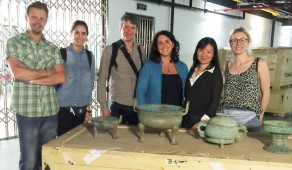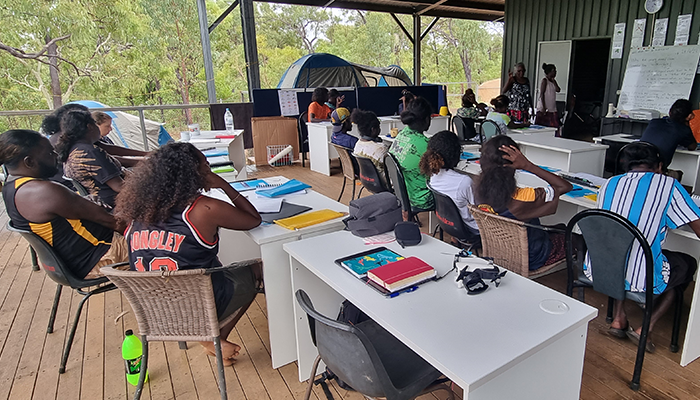Dr Shirley Chan, Head of Chinese Studies at Macquarie University's International Studies, is exploring China's ancient history, culture and philosophy, and their implications for both China and the rest of the world.
As Confucius said, "By revising the old, one knows the new," Dr Shirley Chan believes that as the world becomes more interconnected, understanding another people and another culture will help us become better global citizens in the 21st century.
In this interview, Dr Shirley Chan talks about her research and its impact to society.
I joined Macquarie in 2002. In 2008 I was invited to join the Macquarie Ancient Cultures Research Centre, where I have been able to expand my research into ancient Chinese culture and history.
Many years ago while writing my Masters thesis on Confucianism and Chinese modernisation, I realised there was some misunderstanding and misinterpretation of the Confucian texts. I decided to study the Confucian Analects and early Confucianism as it became important for me to go back to Confucius' own words as contained in the early texts and gain a better understanding of these texts. Since then my research interests in the areas continue to grow as there is always something new to learn.
My research interests are in classical Chinese, and in ancient Chinese culture and philosophy. My recent research explores classical Chinese thought and history in the light of newly-recovered texts that had been lost for more than 2000 years. These ancient texts are of great significance in understanding the development of major strands in Chinese thought, particularly what we now speak of as 'Daoism' and 'Confucianism', which have had an enduring significance in many Asian cultures.
The foundations of Chinese society and its institutions lie in Ancient China. I am hoping my research will provide a better understanding of Confucianism, early Chinese culture and China's long history. Ancient Chinese culture has important implications for both China and the rest of the world; China's people and Chinese culture, both in the past and present, are richly diverse and dynamic. Confucius said, "By revising the old, one knows the new."
As the world becomes more interconnected, understanding another people and another culture will help us become better global citizens in the 21st century. A study of ancient Chinese philosophy and the Chinese classics, embracing the future by paying tribute to the best of the past, will transcend historical and cultural barriers and help foster a better world, marked by mutual understanding and respect.
Go out and celebrate! I would then set up an institute or a centre for the research and teaching of Chinese civilisation, the Chinese Classics and philosophy. This would be in collaboration with world experts and with PhD candidates to further academic and cultural exchange between China, Australia and the rest of the world.
While studying my BA at the University of Sydney I was fortunate to have the opportunity to study classical Chinese and Chinese history under an eminent sinologist, the late Professor Pierre Ryckmans (also known as Simon Leys), and then under Dr Derek Herforth for my PhD dissertation. These highly respected academics continue to be my inspirational figures as a teacher and researcher. At Macquarie I am grateful to have support and encouragement from my colleagues from the Macquarie Ancient Cultures Research Centre.
I would hope my research will have some impact on people's understanding of Confucianism and the Chinese Classics.
I was awarded an international research grant by the prestigious Chiang Ching Kuo Foundation.
Another was the moment when, in a museum in China, I held ancient bamboo slip texts from about 24 centuries ago. Seeing and touching these artifacts brought me so close to the authors of the texts and their world; I felt I was having a direct conversation with them and was able to bring alive Confucius' words in the modern world. It was an amazing experience words simply cannot describe.
More importantly, I shared this significant moment with the BBC during the filming of a documentary called Confucius: his work and legacy. I had the chance to explain these ancient texts and their relationship with the Confucius Classics. I also gave an exposition of my research findings to a larger audience. The documentary was a great international engagement and a recognition of the potential value of the cultural heritage of China, which is part of human history and our shared humanity.
As Confucius said, "By revising the old, one knows the new," Dr Shirley Chan believes that as the world becomes more interconnected, understanding another people and another culture will help us become better global citizens in the 21st century.

In this interview, Dr Shirley Chan talks about her research and its impact to society.
How long have you been at a researcher at Macquarie?
I joined Macquarie in 2002. In 2008 I was invited to join the Macquarie Ancient Cultures Research Centre, where I have been able to expand my research into ancient Chinese culture and history.
I was drawn to research because...
Many years ago while writing my Masters thesis on Confucianism and Chinese modernisation, I realised there was some misunderstanding and misinterpretation of the Confucian texts. I decided to study the Confucian Analects and early Confucianism as it became important for me to go back to Confucius' own words as contained in the early texts and gain a better understanding of these texts. Since then my research interests in the areas continue to grow as there is always something new to learn.
What would be an 'elevator pitch' of your research area?
My research interests are in classical Chinese, and in ancient Chinese culture and philosophy. My recent research explores classical Chinese thought and history in the light of newly-recovered texts that had been lost for more than 2000 years. These ancient texts are of great significance in understanding the development of major strands in Chinese thought, particularly what we now speak of as 'Daoism' and 'Confucianism', which have had an enduring significance in many Asian cultures.
In layman's terms, what is the wider impact of your research?
The foundations of Chinese society and its institutions lie in Ancient China. I am hoping my research will provide a better understanding of Confucianism, early Chinese culture and China's long history. Ancient Chinese culture has important implications for both China and the rest of the world; China's people and Chinese culture, both in the past and present, are richly diverse and dynamic. Confucius said, "By revising the old, one knows the new."
As the world becomes more interconnected, understanding another people and another culture will help us become better global citizens in the 21st century. A study of ancient Chinese philosophy and the Chinese classics, embracing the future by paying tribute to the best of the past, will transcend historical and cultural barriers and help foster a better world, marked by mutual understanding and respect.
If I were given $1M in research funding, the first thing I would do is...
Go out and celebrate! I would then set up an institute or a centre for the research and teaching of Chinese civilisation, the Chinese Classics and philosophy. This would be in collaboration with world experts and with PhD candidates to further academic and cultural exchange between China, Australia and the rest of the world.
Who is/was your biggest research mentor?
While studying my BA at the University of Sydney I was fortunate to have the opportunity to study classical Chinese and Chinese history under an eminent sinologist, the late Professor Pierre Ryckmans (also known as Simon Leys), and then under Dr Derek Herforth for my PhD dissertation. These highly respected academics continue to be my inspirational figures as a teacher and researcher. At Macquarie I am grateful to have support and encouragement from my colleagues from the Macquarie Ancient Cultures Research Centre.
In ten years I see my research...
I would hope my research will have some impact on people's understanding of Confucianism and the Chinese Classics.
My favourite and/or most proud research moment was when...
I was awarded an international research grant by the prestigious Chiang Ching Kuo Foundation.
Another was the moment when, in a museum in China, I held ancient bamboo slip texts from about 24 centuries ago. Seeing and touching these artifacts brought me so close to the authors of the texts and their world; I felt I was having a direct conversation with them and was able to bring alive Confucius' words in the modern world. It was an amazing experience words simply cannot describe.
More importantly, I shared this significant moment with the BBC during the filming of a documentary called Confucius: his work and legacy. I had the chance to explain these ancient texts and their relationship with the Confucius Classics. I also gave an exposition of my research findings to a larger audience. The documentary was a great international engagement and a recognition of the potential value of the cultural heritage of China, which is part of human history and our shared humanity.



